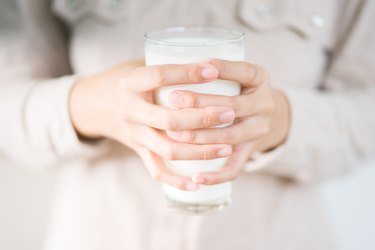What Causes Low Vitamin D And B12

Milk is often fortified with vitamin D.
Image Credit: skaman306/Moment/GettyImages
Low vitamin D and B12 deficiency cause mild chronic ailments and serious diseases. Eating a well-balanced diet may still leave you with low vitamin D and B12 levels. Daily vitamin supplements, however, may make the difference.
Vitamin D and B12 Deficiency
Vitamin B12 deficiencies can result from restricted diets, according to the Linus Pauling Institute at Oregon State University. Natural sources include meat, fish, dairy products, poultry, eggs and fortified breakfast cereals. Your body uses vitamin B12 to make red blood cells, nerves and DNA and for some other functions, Harvard Health reports. It can't be made by the body, and must be provided by food.
Deficiencies are common among older people, especially people over 50. Vegetarians and people who have undergone weight loss surgery are also at risk, Harvard Health reports. Strict vegetarians and vegans need to either eat grains fortified with vitamin B12 or take a supplement. If you've had weight loss surgery, it can interfere with your body's ability to absorb vitamin B12 from food.
Vitamin D is naturally in very few foods which is why milk is typically fortified with it. Without enough vitamin D, bones can become thin, brittle or misshapen, according to the National Institutes of Health Office of Dietary Supplements (NIHODS). Vitamin D helps your gut absorb calcium.
One tablespoon of the most potent natural source of vitamin D, cod liver oil, supplies 340 percent of the daily value set by the Food and Drug Administration, according to NIHODS. A 3-ounce serving of salmon contains 112 percent. Other types of oily fish also provide significant amounts. Individuals who don't eat these important foods should take supplements to ensure that they receive proper amounts of these nutrients.
Lifestyle Causes of Deficiencies
The way you live affects the amount of vitamin B12 and vitamin D you acquire by natural means. Vegetarians shun the most important natural sources of B12 but often make up the shortfall by consuming more dairy products. Vegans who avoid all animal protein must take B12 supplements, if they don't get the vitamin in fortified foods.
Unless you eat oily fish regularly, your primary natural source of vitamin D is the sun, according to the Linus Pauling Institute. Your skin produces vitamin D when it is exposed to proper levels of ultraviolet light. Melatonin in the skin blocks UV light, so people with dark skin need more exposure than light-skinned individuals.
Limited exposure to the sun may help. According to Harvard Health, sunlight contains two forms of radiant energy, ultraviolet A (UVA) and ultraviolet B (UVB). UVB provides the energy your skin needs to make vitamin D, but that energy can also cause sunburn and is a potential cause of cancer. It can also cause premature skin damage and aging. Supplements are the answer.
Medical Conditions and Age
Certain medical conditions could cause deficiencies or malabsorption of vitamin D and B12. To absorb vitamin D, the body must also absorb fat. The inability to digest fat, or fat malabsorption, could be linked to liver problems or cystic fibrosis, according to the Linus Pauling Institute.
In individuals with obesity, vitamin D becomes trapped in fat beneath the skin instead of circulating through the blood, the Linus Pauling Institute reports. Gastric bypass patients also lose some ability to absorb vitamin D.
Intestinal diseases and surgeries also limit the body's ability to utilize vitamin B12, the Linus Pauling Institute states. Alcoholism interferes with the vitamin's absorption. AIDS patients and persons taking drugs which reduce digestive acids experience increased risk. Pernicious anemia, an autoimmune disorder, reduces levels of a critical protein called intrinsic factor and inhibits the body's use of B12.
Both the very young and the elderly are at increased risk for these vitamin deficiencies. Breastfed infants don't receive the extra dose of vitamin D found in formula or fortified milk, according to the Linus Pauling Institute. Lactating women without the right amount of vitamin D in their diets pass this deficiency onto their children.
Atrophic gastritis affects 10 to 30 percent of those over 60, according to the Linus Pauling Institute. This chronic inflammatory disease damages the stomach lining and prevents the proper absorption of vitamin B12.
What Causes Low Vitamin D And B12
Source: https://www.livestrong.com/article/265707-underlying-causes-of-vitamin-d-b12-deficiency/

0 komentar:
Posting Komentar